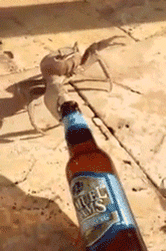a graduation speech about molting
(Originally delivered on June 23, 2018, for the MFA Interaction Design Thesis Festival at SVA.)
For the last five years, I've taught a course here at SVA called Entrepreneurial Design along with my teaching partner Gary Chou. The name of the class makes it sound like it's maybe about how to pick the trendiest millennial pink to lure in investors for your subscription-based LED patio furniture that runs on the blockchain, but the reality is...maybe weirder.
Our class is instead about teaching the fundamentals necessary for taking an entrepreneurial approach to life, which over the years we've identified as:
- How do you make space to explore your own ideas and interests?
- How do you make forward progress despite uncertainty?
- How do you cultivate and leverage networks of support around yourself and your projects?
- How do you build not just for, but also with communities?
This is all pretty abstract, but we anchor it all around the core experience in the class—the students launch $1000 crowdfunding projects out into the real world, and we guide them along the way and unpack what they’ve learned afterwards. (There's a ton of examples, and more details about the class, in the archive Gary and I put together.)
The course is constantly evolving, but what’s pretty consistent is what it feels like to teach the course— somewhere between a therapist and a skydiving instructor. I can’t describe firsthand exactly what the student experience is like, but here are some GIFs this year’s students used to describe their experience in the class:
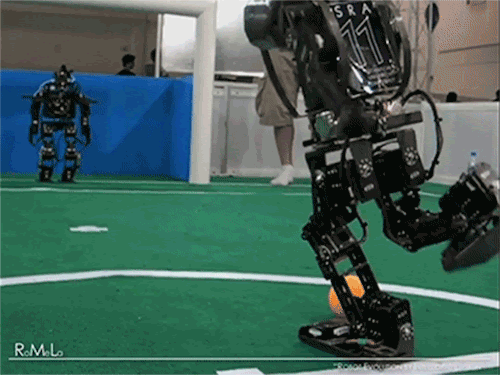
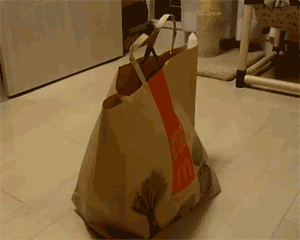
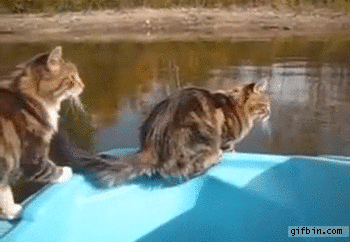
All of this history is why I’m so honored to be the one who gets to send you all off. But it has also made it hard to figure out exactly what I should use my time to say! As one of the younger faculty members, I don't have that many years of life experience and wisdom to draw on. As your former teacher, I've already used up most of my best GIFs :(
So instead, I’m going to talk about what I’ve learned from my years of living the Entrepreneurial Design life for real. And I'm going to use the finest crab GIFs I could find.
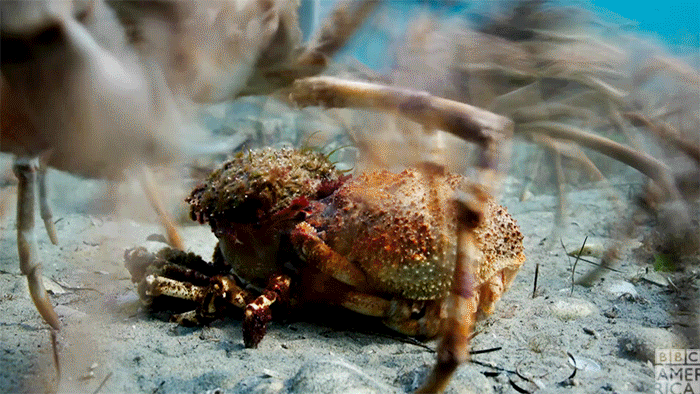
Molting is absolutely necessary for many animals, like insects, crustaceans, and reptiles: it allows them to grow, to regenerate damaged tissue and missing limbs, even to radically change shape to move onto the next phase of their development. The animal shakes off their old shell or skin and grows a new one that better fits its body.
For us, our shells are our identities. Our portfolios, our resumes, the accolades we've accumulated that we're proud of. They're what we tell people our strengths and weaknesses are. They're the responsibilities we default to, the challenges we shy away from, the mistakes we convince ourselves not to make again. Our shells are the stories we tell about ourselves.
Today, you have just finished molting. You are, in this moment, casting aside the husk of your previous identity and emerging as a new, shiny, interaction designer! This is a new identity—a new shell—that you've worked hard to develop over the last 2 years.
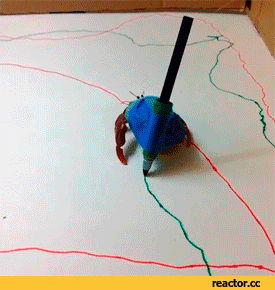
As you get used to your new shell, everything is exciting and anything is possible, even if it's all also unfamiliar. The new you is a little bit of a stranger, a blank canvas. It's a time of transformation and aspiration—a time to remake yourself.
You'll spend the next few years figuring out all the things your new shell lets you do: new skills you used to be intimidated by, new things to be confident in, new challenges you want to tackle. You’ll discover new limits, too—things you no longer care about or prioritize, new obstacles to struggle against.
Your new shell empowers you not just to try new things, but to build new networks, too. Starting with everyone in this room and beyond in the SVA community. As I’ve said a million times in class before, it’s these networks that will really shape your lives and your work.
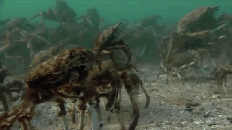
I know all this because I've done my fair share of molting.
This year marks a full decade since what I count as the starting point of my career—in April 2008, a few friends and I, mostly still college students at the time, put together the first conference devoted to internet culture in the US. Almost 700 people attended, among them many internet celebrities, writers, and current and future leaders of the tech industry. We ran it two more times, ending it in 2012.
ROFLCon was my first identity, an iridescent new shell. For the first time in my life, I knew who I was—a commentator on internet culture, an event organizer, an operations person who could bring order to chaos. It gave me a network beyond my wildest dreams, connecting me easily to people I had no business being friends with. It opened doors for me, too, including to here—Gary and I first met at the last ROFLCon in 2012. For a confused college grad with the misfortune of graduating during the worst of the economic recession, my identity as one of the co-founders of ROFLCon gave me social cachet and a rough direction to head towards.
And yet, over the next 5 years, each part of this identity lost its luster over time.
I kept working with internet culture by running a company called Breadpig, a small quirky publisher that made internet-friendly merch and worked with webcomic artists. We were really innovative with our business models and I loved the artists we worked with. But after a few years, I found myself questioning whether there wasn't something more important I could be doing than counting cash on convention floors.
At the same time, I continued the work of being an event organizer and community wrangler with Awesome Foundation, a decentralized philanthropy community that I served as an international coordinator for about five years. Looking back, I’m so proud of the work I did there—building infrastructure that helped the commuinity grow literally exponentially, laying important groundwork that’s held up since. But doing so much community work without paying attention to self-care—a concept that hadn't been mainstreamed yet—burnt me out.
In both of these roles, I was using the operations skills I had learned during ROFLCon. But I felt myself chafing at always being the person cleaning up the creative mess.
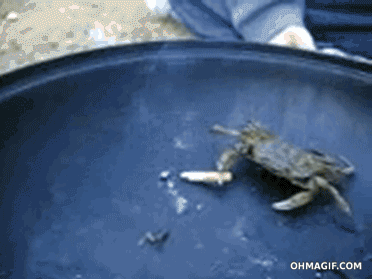
I grit my teeth through these discomforts and stuck with it because I interpreted my growing lack of interest in these roles as laziness. That didn’t help. At my worst during this phase, I became a bit of a hermit because I couldn't bear to hear other people introducing me. I literally hid in a bathroom during an event I had organized because I was so emotionally overwhelmed by having to live up to this persona I had created. I thought I had permanently broken some part of myself.
In the end, my body and my brain gave me no choice but to take a big step back and just let go. It was only through slowly disentangling myself from these obligations that I realized—I had actually been growing that whole time, and it was simply time to molt.
And this is what I want you to remember: molting is natural and good. Molting is proof of growth.
The more common metaphor for transformation is caterpillars turning into butterflies, but that only happens once. Crabs molt 15-20 times in their lives—some molts lead to dramatic changes, others less so. Humans, with our identity shifts, are more on this level. My friend Zach, one of the cartoonists I used to publish, made a comic that has stuck with me for years. He asserts that if it takes you 7 years to get really good at something, you effectively have the opportunity to lead 11 different lives throughout your natural lifespan.
That means that the molt you go through today, as big and momentous as it is, probably won’t be the last. And that this identity you’ve just built for yourself, as shiny and wonderful as it is now? At some point, it may feel constricting and you’ll have to remember to let it go.
Molting is hard. In nature, it’s a costly and vulnerable process. It requires a huge amount of energy, debilitating the molter and leaving them literally exposed and thin-skinned. It's a deeply uncomfortable time for people, too. You get to feel new and shiny on the other side, but while you’re in it: it sucks. In a culture where forward progress is idolized and performed en masse, it feels like a big risk, and maybe even a failure, to slow down and take the time to make these transitions.
It feels extra terrifying—and threatening—to interrogate the very identity and strengths that have carried you this far. And yet, as with crustaceans and insects and reptiles, we have to do this to keep growing.
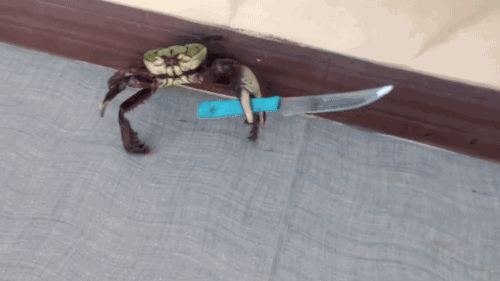
I’m telling you all of this because it’s easy to think about this as the first day of the rest of your life, but really, you’ll have a few more of those. What I’ve learned through my wanderings is that growth doesn't look like a straight line, or even like a step function—it's a spiral, where you go through the cycle again and again but with more skills, more networks, more wisdom each time. All you can do is acknowledge and accept change, and learn how to be more resilient through it.
You get better at this mostly with practice, but here are some shortcuts that might help.
Iterate on your identity. If we think of growth as a design practice, the material you’re working with is yourself. That means you have to understand your own affordances, and be willing to iterate on it. Figure out what stories you’re telling about yourself, and think through what slightly different stories would unlock. Be wary of telling negative stories that start with “if only”—work with what you have.
The important stuff will resurface. Trust that any part of your identity you abandon can be picked back up. At the end of my story earlier, I ran away from internet culture and community building and towards a career in ethnography in China. Four years later, I teach a class about community building, and write a newsletter about Chinese internet culture. Your experiences stay with you, and can be recombined into all kinds of new stories and identities.
Document your journey. These cycles of growth are like very personalized seasons—they come and go, and you can’t really control when. But over time, you learn to recognize the signs, just like you can tell when the seasons are turning. To help in this process, document your thoughts along the way, even when things are good—what are you excited about? What are you fearful of? What are your aspirations and when do those change? Use the practice of writing to surface these patterns so that you can learn to ride the waves instead of fighting against them.
You already know how to do this. Mostly importantly, you already know how to do this because you just DID IT. For many if not all of you, coming to SVA was a conscious choice to make a big change in your lives. Not every transition requires grad school, but think about the components of what made this work: you gave yourself two years to focus on learning and experimenting, you acquired a supportive network of peers and mentors, and you broadcast your transition to people around you by using the identity of “student”. You can replicate these structures in other ways for other transitions.
Class of 2018, today, you have just finished molting. You are, in this moment, casting aside the husk of your previous identity and emerging as a new, shiny, you. This may not last forever, but savor the newness and let it propel you towards becoming the next you that you want. Trust in yourself, and trust in the process. I can’t wait to see what you all grow into. Thank you, and see you at the reception.
